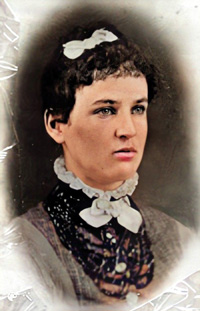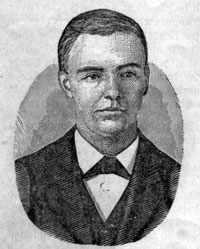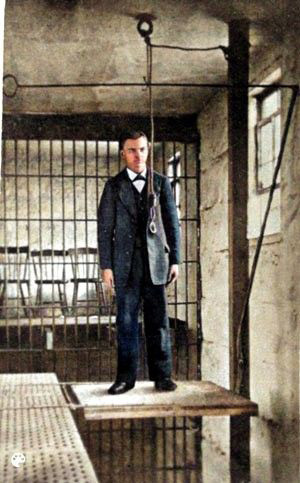Iroquois Theatre Fire - 1903
Much of the information presented here was obtained from the book "Tales From the
Trees" published in 1981 by Ailene Hayes Schneider.
Ella Martin Murder

Probably the most lasting tragedy in Minonk was that of the murder of little
Ella Martin. The murder case had all the elements for a sensational story; sex,
violence, vigilantism and the compassion of a local citizenry swept up by
the emotions of the murder. Equally interesting is the convoluted and wordy
prose used by the newspapers in reporting the story.
Ella Martin was the seventeen-year-old daughter of John Martin who had
five children and lived on a farm one mile south of Minonk.
On October 10, 1879
Ella was walking home from church when she was encountered by a local blacksmith
apprentice by the name of Johannes DeBoer, a recent immigrant from Germany.
When Ella rejected the advances of DeBoer he became enraged and attacked her.
Below is a description of the attack as described in an account of the murder
in a book written by a firm from Dwight, IL. It reveals the unusual prose of
the time.
..."Where are you going?" She replied that she was going home and attempted
to pass him. He said she could not pass, and at the same time made her an
infamous proposal, from which her pure nature turned in disgust and against which
she rebelled. She again attempted to pass and said she would scream if he did not allow her
to do so. Thereupon he grasped her by the throat and hurled her backward to the
ground at the side of the track. Bravely, she battled for honor, virtue and
life, struggling against the fierce onslaught of the demon-possessed
blacksmith, but he held her throat in a vice-like grip, and soon her struggles
ceased.
Johannes DeBoer

Ella was stabbed and left to die by DeBoer. She lay at the edge of the cornfield
near death until she was found the next morning by her brother on his
way into town. She was taken to her father's house where she lay dying.
She managed to name DeBoer as the attacker. Marshal McGrail went to the blacksmith
shop to arrest DeBoer and brought him back to Ella's deathbed where she identified
him as the attacker. The local citizens became extremely upset when the news
of the attack spread.
Threats of lynching were made and so DeBoer was hustled
off to Metamora and put in jail away from the mob. The next morning Ella died
as described in the book about the murder.
Next Sunday morning at eight o'clock, the soul of Ella Martin passed away to
endless rest. A weary week of suffering, surrounded by loving friends who
gently ministered to her every want, cared for and watched over by her bethrothed,
and then the Lord in His infinite wisdom and mercy sent forth the summons, and
her spirit, pure and free, was borne away beyond the confines of earthly hopes
and fears; away from earthly darkness and sin; up to the pearly gates and
golden streets of the heavenly city, to dwell evermore in the palace of God.
She is dead!
After learning of Ella's death, local men formed a vigilante group
and headed to Metamora where they demanded the head of DeBoer held in the
county jail. The jailer convinced the mob that they had transported DeBoer
to the Peoria jail because he had tried to set fire to his jail cell. This
disbursed the mob from Minonk.
Ella's funeral may have been the biggest funeral Minonk ever had. The businesses
were closed and the schools dismissed. About 400 people went to the Martin
house where the first services were held. Over one hundred carriages formed
a procession back into town for the church services, which was packed to
overflow. The services concluded with the following farewell song by the
Methodist choir.
Farewell my mother dearest, farewell my brothers,
Farewell to all the loving friends of my heart;
Father will meet me, I'll be waiting to greet thee;
Far in the sunny clime where friends never part,
Farewell Ella, sweet loving Ella.
Oh! The Lord has taken darling Ella home to the sky.
DeBoer was quickly tried and convicted of murder. He was sentenced to be
hanged on March 10, 1880 in Livingston County. Here is a description of his hanging from
the book about the murder.
In the presence of fifty people DeBoer stood on the little platform with
the rope around his neck; and while solemn silence sat like a pall upon
them, the signal was given, the spring was touched, his soul passed out
into the great beyond, and JUSTICE was satisfied. The execution was conducted
in a very orderly manner and reflects great credit on Sheriff Hunter who had
charge of the whole affair. Thus ends DeBoer!
After Ella Martin was buried in the Minonk Cemetery, a number of local
citizens formed a committee to purchase a large monument for her grave.
Shares were sold for 50 cents apiece and $700 was raised to erect a
monument. The monument is very large and ornate and still stands in the
Minonk Cemetery half way between the first two drives on the west, half way back
to the north.
Johannes DeBoer before his hanging

Iroquois Theatre Fire
Years ago many Minonk residents did much of their shopping in Chicago, which had a much better selection of goods. In those days rail service from Minonk was available and train travel to Chicago was sometimes preferable to motoring to a town like Peoria especially since few women drove cars. The Stoddard family was probably the wealthiest family in Minonk and went to Chicago frequently.
During the Christmas vacation of 1903, Mrs. Bela Stoddard who, with her daughter Zadel and son Donald, went to Chicago for a medical appointment for her son. After the medical appointment the children went to the Iroquois Theater to see the play "Mr. Bluebeard, Jr." while Mrs. Stoddard stayed at the Annex. Unfortunately, during the play a fire started on the stage. The asbestos curtain got stuck half way down and the fire leaped out into the audience causing a panic to the exit. The exits became jammed with people who eventually became crushed to death or suffocated from either the smoke or from being buried under the bodies stacking up by the exits. Almost 600 people died in the fire, one of the worst fire disasters ever.v
When Mrs. Stoddard learned of the tragedy she telephoned her husband, who with Mr. Fred Simater, left for Chicago by special train from Mendota. After a search of the city's morgues the Stoddard children were found in separate morgues. Mr. and Mrs. Stoddard left for home while Mr. Simater remained to arrange the shipping of the bodies back to Minonk. A large group of people was reverently waiting at the depot when the bodies arrived in Minonk. The whole community felt the shock and sorrow of two innocent lives lost at such a young age.
Below is the writeup from the Minonk News on January 6, 1904.
Obituary
Tragedy and Comedy walk hand in hand while one rings the silver bells of mirth, the other throws open the door of the Sepulchre. Never did this old saying have more swift and literal fulfillment than when Death stalked into the Iroquois Theatre, Chicago, on Wednesday afternoon, Dec. 30th, in the midst of a presentation of the mirth-provoking opera "Mr. Bluebeard, Jr.". The beautiful new theatre was crowded to the doors, even "stand room only" tickets had been sold; they were largely women and children, happy families enjoying a holiday treat together. Children with their dolls and toys in arms, out-of-town visitors, suburban parties, all old and young laughing merrily at the fantastic actors, and enchanted with the gorgeous setting of the play, when suddenly came the cry of "fire!" and in the twinkling of an eye the scene changed, panic and pandemonium reigned, every light in the house went out and left the frightened, struggling, crying, groaning multitude in Stygian darkness and suffocating smoke. The great asbestos curtain which should have fallen and cut off the furnace fires on the stage from the auditorium descended only half way and then stuck. Lurid, angry tongues of fire, and in a moment, great billows of flame leaped under it in pursuit of the horror stricken multitude fleeing from them, trampling each other to death in the narrow aisles and at the door ways, each victim blocking the way for some one else and rolling up the awful list of the dead, until it reached almost 600.
Not only Chicago but the whole northwest was represented in that list: Minonk by two, Miss Zadel M. Stoddard and Donald Austin Stoddarn, children of Mr. and Mrs. B. M. Stoddard. WIth Mrs. Stoddard they had gone to Chicago for treatment of Master Donald's hearing. Early after luncheon they gaily bade the mother goodbye at the Annex and went to the doctor's office, and then to the Iroquois to enjoy the brilliant opera.
When her children did not return, and the news of the awful catastrophy reached Mrs. Stoddard, she at once telephoned Mr. Stoddard, who with Mr. Fred Simater left for the city by the way of Mendota, traveling from there by a special train. Long before this a search was instituted and diligently continued by men, who were personal friends of the family in Chicago, and also by employees of the Hotel, to whom their faces were familiar. A search was quickly instituted in the hospitals in the hope that they might be found among the injured, but living. It proved sadly in vain. Then they turned with trembling steps to the morgues. Donald was found at Jordan's. Death had come to him mercifully, by suffocation, for there was no blight of flame or scar of trampling upon his fair form. He lay as peaceful as if sleeping in the protection of his own home; his right hand clasping the hand of a fair little girl. A further search of several hours discovered Miss Stoddard at Rolston's. She too was untouched by fire, but bore some scars that tell with pitiful plainness of the terrible struggle she had made in that awful battle with death in the darkness to save her brother. When identification was complete and the bitter news was broken to the waiting mother, around whom many friends had gathered at the hotel, Mr. and Mrs. Stoddard left for home, while Mr. Simater remained to attend to the shipping of the bodies, which arrived in Minonk at 1:30 p.m. Friday. A sad homecoming indeed for the happy young lives which had been so ruthlessly cut short! A large concourse of people stood reverently at the depot while the caskets were borne to the hearses; for the whole community has felt the shock of this calamity and sympathizes with the home, stricken with this double sorrow.
Miss Stoddard, or "Della" as she was familiarly called, was born in Minonk Nov. 27th, 1873. She graduated from the public schools and then with her sister, Miss Lita, took the course prescribed at Ferry Hall Seminary, Lake Forest, Ill., graduating with honor in 1895. She was a bright, energetic, capable girl, who loved to do thoroughly whatever she undertook. Her unselfish and helpful spirit, her genial ways and social disposition, her high ideals and active work in everything that would do good made her popular and beloved by all classes of people. She was a most active member in the Presbyterian Church, with which she united when about 12 years of age. In the Sabbath school work, in the choir, in every social function she labored willingly and with the executive ability. Largely through her inspiration and benevolence the new pipe organ was placed in the church and she had given herself with great diligence to the study of the organ, that she might more helpful in the service of praise.
In the home she was a spirit of sunshine and good will, who thought of everybody's comfort and labored for all. A tender, faithful daughter, a loving, helpful sister, whose ministry of love and music and song went far in the making of a happy home. Not only the home, therefore, but the church, the Sunday school and the community at large will miss this beautiful life.
Donald was the youngest in Mr. and Mrs. Stoddard's family of six children. He was born August 20th, 1892. He was a fair and manly little fellow, who as the baby of the household had been the pet of all, but unspoiled by such attention he grew every day to be a greater comfort and help to all. Many little companions loved him and will mourn his sad and sudden death.
The funeral services were held from the bereaved home on last Sunday afternoon at 2:30 p.m. For an hour and a half before that hour a great company of friends passed through the reception hall to take their last view of the familiar faces. One wreathed in pink roses in her casket of black, and one surrounded with white carnations in his casket of white. On every hand rare and fragrant flowers, from friends near and far, gave silent witness to the love and esteem of hearts that were mourning. The services were conducted by Rev. H. K. Denlinger D.D. of the Second Presbyterian Church, Bloomington, and Rev. L. F. Cooper, pastor of the Presbyterian church, Minonk.
Edward and William Priebe, Allen and Harry Simpson, William Thom and Raymond Goodrich acted as pallbearers and when the tender services were finished and the last farewells said, bore those beloved children from the home they had loved and graced to their resting place in the silent city of the dead. Minonk has probably never experienced a deeper shock and shadow of bereavement than that which this calamity has brought upon her. A sense of personal loss has swept through the whole community, which sorrows with this afflicted home.